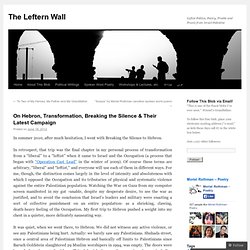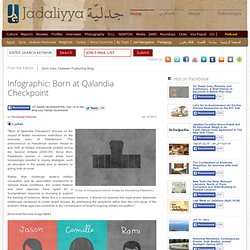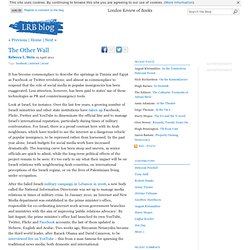

Signs of a transitional moment in the Israeli-Palestinian dynamic. The fragility of the Palestinian Authority and growing support within Israel for direct control over the West Bank are reshaping the political dynamic. President Abbas, former Egyptian President Mubarak, Prime Minister Netanyahu and President Obama in a White House meeting. Time is running out for the Palestinian Authority (photo: Pete Souza / white house) There are growing signs that the occupation/Palestinian issue is undergoing one of its transitional moments, after which new forces will be at play. On the surface, things are as static as they could be: Inside Israeli society, there is a total denial of the occupation – the Levy committee’s report being just one aspect of it.
No major political forces are offering any new idea that could end the occupation.
Apartheid in Israel / Palestine? - perspectives... On Hebron, Transformation, Breaking the Silence & Their Latest Campaign. In summer 2010, after much hesitation, I went with Breaking the Silence to Hebron.

In retrospect, that trip was the final chapter in my personal process of transformation from a “liberal” to a “leftist” when it came to Israel and the Occupation (a process that began with “Operation Cast Lead” in the winter of 2009). Of course these terms are arbitrary, “liberal” and “leftist,” and everyone will use each of them in different ways.
Dis-cover The Territories.
The West Bank. The Israeli legal system in occupied territories. Visualizing Occupation: Distribution of Water. Checkpoint date: When dinner isn't the only check you have to worry about from Tanya Keilani. Infographic: Born at Qalandia Checkpoint. "'Born at Qalandia Checkpoint' focuses on the impact of Israeli movement restrictions on the everyday lives of Palestinians.

The phenomenon of Palestinian women forced to give birth at military checkpoints peaked during the Second Intifada (2000-05). Since then, Palestinian women in remote areas have increasingly resorted to coping strategies, such as relocation in the weeks prior to delivery or giving birth at home. Rather than challenge Israel’s military occupation and its associated checkpoints to address these conditions, the United Nations and other agencies have opted for a 'humanitarian' response in choosing to support the training of midwives. While this is a necessary measure, it should not supplant the legal and/or diplomatic challenges necessary to curtail Israeli abuses. It's the occupation, stupid. It's the show that time and the world forgot.

It's called the Occupation and it's now in its 45th year. Playing on a landscape about the size of Delaware, it remains largely hidden from view, while Middle Eastern headlines from elsewhere seize the day. Diplomats shuttle back and forth from Washington and Brussels to Middle Eastern capitals; the Israeli-Turkish alliance ruptures amid bold declarations from the Turkish prime minister; crowds storm the Israeli embassy in Cairo, while Israeli ambassadors flee the Egyptian capital and Amman, the Jordanian one; and of course, there's the headliner, the show-stopper of the moment, the Palestinian Authority's campaign for statehood in the United Nations, which will prompt an Obama administration veto in the Security Council.
How to disappear a land Occasionally - say, when riding through a narrow passage between hills - it was possible. Restrictions are strictly enforced and violations dealt with harshly. Living amid checkpoints A musical Intifada.
To sort... The Separation Wall. The Other Wall. It has become commonplace to describe the uprisings in Tunisia and Egypt as Facebook or Twitter revolutions; and almost as commonplace to respond that the role of social media in popular insurgencies has been exaggerated.

Less attention, however, has been paid to states’ use of these technologies as PR and counterinsurgency tools. Look at Israel, for instance. Over the last few years, a growing number of Israeli ministries and other state institutions have taken up Facebook, Flickr, Twitter and YouTube to disseminate the official line and to manage Israel’s international reputation, particularly during times of military confrontation. For Israel, there is a proud contrast here with its Arab neighbours, which have tended to see the internet as a dangerous vehicle of popular insurgency, to be repressed rather than harnessed. In the past year alone, Israeli budgets for social media work have increased dramatically.